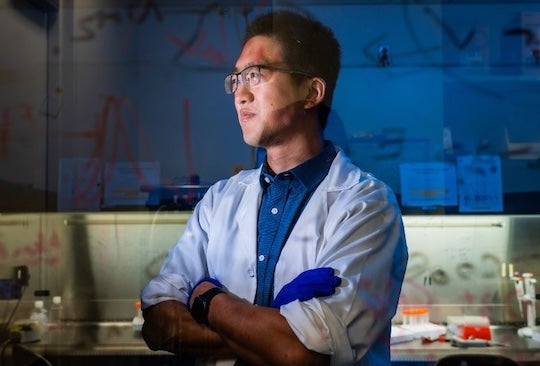Rice University chemist Han Xiao has been awarded nearly $2 million from the National Institute for Health Maximization Investigator Award (MIRA) program for established investigators.

All organisms with a few exceptions use 20 standard amino acids to build proteins. Xiao’s research aims to reprogram the genetic code to precisely manipulate biological systems by using non-canonical amino acids (ncAAs) with different properties to help build proteins. Researchers generally use ncAA to probe the structure and dynamics of proteins, but Xiao wants to take it a step further.
“This innovative approach could revolutionize the way we understand and control cellular functions,” said Xiao, Norman Hackerman-Welch Young Investigator, associate professor of chemistry, director of Rice’s Synthesis X Center and an Institute for Cancer Prevention and Research of Texas.
Xiao will use the five-year grant to develop innovative cells capable of biosynthesizing and utilizing ncAAs and explore their potential as in vivo sensors for enzymes involved in posttranslational modifications (PTMs).

PTMs are essential for the regulation of cell biology. Enzymes that add and remove PTMs, known as “writers” and “rubbers,” play a major role in causing various diseases, including cancer and neurological disorders.
Current methods for detecting these enzyme activities, such as fluorescence assay, western blot, and mass spectrometry, are limited to laboratory settings. Xiao’s research seeks to develop ways to monitor these activities within living organisms.
“Our goal is to create eukaryotic cells that can produce proteins with PTM handles, enabling real-time monitoring of enzyme activities,” Xiao said.
These engineered cells may pave the way for new strategies in disease treatment by providing valuable insights into the effectiveness of epigenetic inhibitors in living subjects.
MIRA supports research in the laboratory of an investigator who is within the mission of the National Institute of General Medical Sciences (NIGMS). MIRA’s goal is to increase the efficiency of NIGMS funding by providing investigators with greater stability and flexibility, thereby increasing scientific productivity and the chances of significant breakthroughs.
#Rice #research #aims #reprogram #genetic #code
Image Source : news.rice.edu

